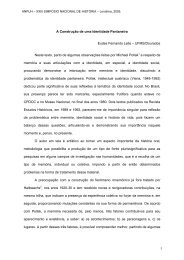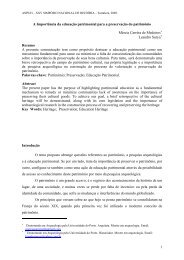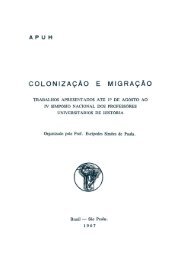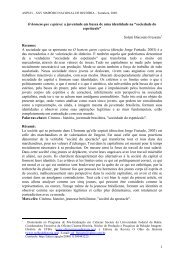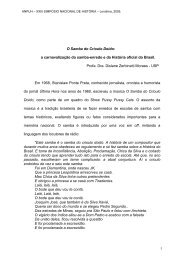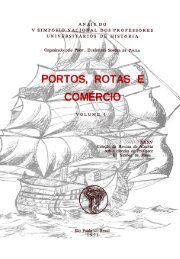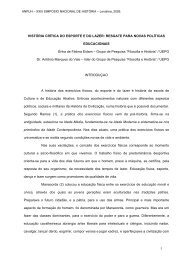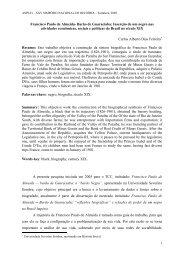- Page 1 and 2:
1 9 6 2 I I SIMPÓSIO DOS PROFESSÔ
- Page 3:
ERRATA Pg. 197 - linha 15, leia-se
- Page 7:
I Promoção do Simpósio
- Page 10 and 11:
6 COMISSAO ORGANIZADORA Diretoria d
- Page 12 and 13:
9 horas - 3.- SessAo de Estudos. Tt
- Page 15 and 16:
Constantino, Marta Clara R. T. - Ma
- Page 17 and 18:
SOuto, Amérlco da Costa - Curitlba
- Page 19 and 20:
PARANA Aguiar, Antônio Cardoso Bal
- Page 21 and 22:
Matos, Odilon Nogueira de Melo, Clo
- Page 23 and 24:
REGULAMENTO DO II SIMPóSIO DOS PRO
- Page 25 and 26:
§ único - Em qualquer caso, as mo
- Page 27 and 28:
talvez tenhamos apenas, e comodamen
- Page 30 and 31:
Curitiba, 31 de outubro de 1962. a)
- Page 32 and 33:
MOÇAO N.o 7 Os professõres partic
- Page 34 and 35:
Amália Hermano Teixeira Maria Jos
- Page 36 and 37:
seus eminentes Professôres, na pes
- Page 38 and 39:
MQÇAO N.o 16 Os abaixo-assinados,
- Page 41 and 42:
MOQAO N.o 21 Que seja enviado ao Di
- Page 43 and 44:
EXPOSIÇAO DE CARTOGRAFIA HISTóRIC
- Page 45:
II Comunicações
- Page 48:
giea da História", isto é, a Filo
- Page 51 and 52:
pria fôrça e já não queriam obe
- Page 53 and 54: mo no comunismo, porque "o Socialis
- Page 57: Ao Prol. Miguel Sehall: - Em nossa
- Page 60 and 61: Devia escolher dentro do temário p
- Page 62 and 63: Para encerrar êste capítulo, deve
- Page 64: PROPRIEDADE COMUNITARIA OU DE CARAT
- Page 67 and 68: property. He presents the three kin
- Page 69 and 70: 3 - Elogio à expressão "realmente
- Page 71: 2 - Sugere a forma Frederico Barbar
- Page 74 and 75: Ao Prol. Pedro Calmon: Agradece a i
- Page 76 and 77: cedentes medievais e suas sobreviv
- Page 79 and 80: do pessoalmente, ou baseando-se em
- Page 81 and 82: ção a parte a), do trabalho dos p
- Page 83 and 84: sideração dos mecanismos de conti
- Page 85 and 86: Teme as conseqüências de uma posi
- Page 87: RESPOSTAS DO PROF. GUY DE HOLLANDA:
- Page 91 and 92: publicus, com a conivência dos mag
- Page 93 and 94: A Africa do Norte pode servir de ex
- Page 95 and 96: vam em sangrentas repressões, com
- Page 98: Já verificamos o regime de terras
- Page 101 and 102: ém um aspecto patriarcal em que o
- Page 106 and 107: sidade. Porém, o Autor não acentu
- Page 108 and 109: Na verdade, todos os políticos vis
- Page 110 and 111: Ao Prol. Pedro Freire Ribeiro: Não
- Page 112 and 113: A Prola. Maria da Glória Alves Por
- Page 115 and 116: PROBLEMAS JURíDICO-SOCIAIS DO ESTA
- Page 117 and 118: poneses (dihqãns) como auxiliares
- Page 119 and 120: tornou-se a aplicação dêstes pri
- Page 121 and 122: considerado pessoa de vontade próp
- Page 123 and 124: Os proprietãrios tendiam a ampliar
- Page 125 and 126: Em conclusão, podemos ver que, se
- Page 127 and 128: are the "hima"; others are kept by
- Page 129 and 130: geral dos bens, de seitas de carát
- Page 131 and 132: técnicas, após a chegada dos turc
- Page 133: CONTRIBUIÇAO AO ESTUDO DA HISTÓ'R
- Page 136 and 137: é um fato muito importante. O Cons
- Page 138 and 139: de penúria, vivendo de pequenas pl
- Page 140 and 141: Quando o gado se multiplicava, o se
- Page 142 and 143: Nos inventários das famílias faze
- Page 144 and 145: 1820, e Etienne de Rencourt em 1900
- Page 146 and 147: Tôda a estrutura social e econômi
- Page 148 and 149: que aumentava o novo modo de uso da
- Page 150 and 151: Municipal daquela cidade informava
- Page 153 and 154:
valor que tem naturalmente tomado o
- Page 157 and 158:
(9) Saint-Hilaire - "L'Agriculture
- Page 159:
(56) Carta do Barão do Tibagi, Ms.
- Page 162 and 163:
1: fácil compreender que uma regi
- Page 164 and 165:
Ainda para facUltar a vinda de colo
- Page 166 and 167:
de Catarina li, princêsa 'alemã d
- Page 169 and 170:
As autoridades alimentavam esperan
- Page 171 and 172:
a principio de Maio, quando era imp
- Page 173 and 174:
tste fato é de grande significaç
- Page 176 and 177:
3 mil litros diários de leite. A p
- Page 178 and 179:
am na Cooperativa Batavo de Carambe
- Page 180:
tados a melhor prêço, associaram-
- Page 183 and 184:
pois acreditam que qualquer modalid
- Page 185 and 186:
gem de novas iniciativas, oficiais
- Page 187:
de realizar comparações entre a c
- Page 190 and 191:
processo de miscegenação, gerando
- Page 192 and 193:
das produzidas pela compra e venda
- Page 194 and 195:
saltam as fazendas e as tropas de m
- Page 196:
Ao Prol. Pedro Calmon: O argumento
- Page 201 and 202:
catória que dividia as terras port
- Page 203 and 204:
per1or, Conselho de Pesquisas da Un
- Page 205 and 206:
como nos diversos niveis das trinch
- Page 207 and 208:
guas abaixo da colonia Thereza. Tem
- Page 209:
Fig. 1 - Levantamento parcial da pl
- Page 213:
Fig. 4 - Detalhe das escavações.
- Page 217:
Fig. 8 - Mó ou pedra de amolar. Fi
- Page 221 and 222:
Com a abertura sistemática das tri
- Page 223 and 224:
INTERVENÇOES Do Prol. José Perrei
- Page 225:
Ao Prol. Guy de BoUanda: - Agradeç
- Page 228 and 229:
ção vigente, pelos obstáculos qu
- Page 230 and 231:
o pensamento do sábio espanhol, or
- Page 232:
Em janeiro de 1802, numa petição
- Page 235 and 236:
Um Paraguai pressionado por hordas
- Page 237 and 238:
(22) - Azara, Felix - Memoria sobre
- Page 239:
Ao Prof. José Roberto do Amaral La
- Page 242 and 243:
QUADRO N.O 1 Formas de ocupação d
- Page 245:
claros elementos de d11erenciação
- Page 248 and 249:
QUADRO N.O 4 Estabelecimentos, áre
- Page 250 and 251:
CAPíTULO m CRONOLOGIA DA AREA ESTU
- Page 252:
perde em 1890 o topônimo de Santo
- Page 256 and 257:
Os comerciantes de gado da Capital
- Page 258 and 259:
as roças dedicavam-se quase exclus
- Page 260:
almente os roceiros morrem primeiro
- Page 263 and 264:
AS SESMARIAS NO BRASIL HltLIO VIANN
- Page 265 and 266:
SESMARIAS DE MARTIM AFONSO DE SOUSA
- Page 267 and 268:
ceder das ações novas que na Bahi
- Page 269 and 270:
Pardo e Contas (31). Não nos esque
- Page 271:
SESMARIAS NO "REGIMENTO" DE 1677 Em
- Page 274 and 275:
foram ou não já dadas de sesmaria
- Page 276 and 277:
"Nada se equipara à injustiça e
- Page 278 and 279:
o da Agricultura, criado em 1860, i
- Page 280 and 281:
(1530-1533)", na História da Colon
- Page 282 and 283:
47) - Pe. Luís Gonçalves dos Sant
- Page 284 and 285:
Do Prol. Odilon Nogueira de Matos:
- Page 286 and 287:
No estudo das vicissitudes efetivas
- Page 288 and 289:
Ao Prol. Moacyr de Góes: De pleno
- Page 290 and 291:
tantemente modificada, no caso das
- Page 292 and 293:
que se dizia cáusticante e incompa
- Page 294 and 295:
dade ostentosa que não se compadec
- Page 296 and 297:
Entre os pioneiros desse sistema de
- Page 298 and 299:
da sem ter prêviamente comunicado
- Page 300 and 301:
Quando Von Tschudi na qualidade de
- Page 302 and 303:
nos do "inconveniente de terem a se
- Page 304 and 305:
libertar-se delas. A situação peo
- Page 306 and 307:
Mais do que isso o que havia era um
- Page 308 and 309:
a)) Por cada pessoa adulta de um, e
- Page 310 and 311:
take the place of the work done by
- Page 312 and 313:
graduado do Corpo de Engenheiros re
- Page 314 and 315:
(34) Em varios anos entre 53 e 57 a
- Page 316 and 317:
(51) A revolta de Ibicaba assumira
- Page 318 and 319:
(62) Mass. Floriano de Camargo Pent
- Page 321 and 322:
car que êles se confirmam quanto a
- Page 323 and 324:
3) Problema da falta de mercado int
- Page 325 and 326:
publicados e outros ainda inéditos
- Page 327 and 328:
TINGUA: UMA EXPERI1:NCIA DE COLONIZ
- Page 329 and 330:
-granjeiros: os entraves da topogra
- Page 331 and 332:
pografia, presta-se mais a estas ú
- Page 333 and 334:
Thus when the official support less
- Page 335 and 336:
PROPRIEDADE DA TERRA NO RIO GRANDE
- Page 337 and 338:
léguas de costa para cada Capitani
- Page 339 and 340:
enhas Homem e Feliciano Coelho, men
- Page 341 and 342:
:a:ste foi o grande uso da terra in
- Page 343:
Padrão de Touros
- Page 347 and 348:
opinião que o marco de Touros, na
- Page 349 and 350:
JOAQUIM INACIO DE CARVALHO FILHO, P
- Page 351 and 352:
portações. o Estado sangrava na s
- Page 353 and 354:
2. O autor oferece a solução para
- Page 355:
Capa da Revista do Instituto Histó
- Page 359:
Capa da Revista do Instituto Histó
- Page 363:
última página do estudo "Vale do
- Page 366 and 367:
Ou seja pelo lançamento do imposto
- Page 368 and 369:
NOTAS EXPLICATIVAS 1.") Todos os Su
- Page 370:
Contribuição ao estudo da histór



